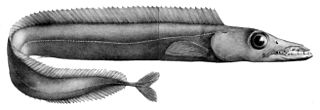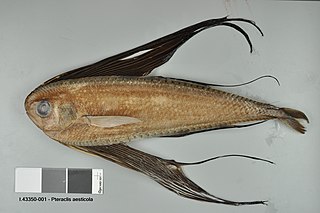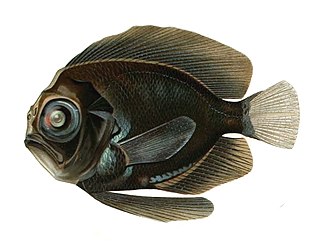
The cutlassfishes are about 45 species of predatory ray-finned fish in the family Trichiuridae of the order Scombriformes found in seas throughout the world. Fish of this family are long, slender, and generally steely blue or silver in colour, giving rise to their name. They have reduced or absent pelvic and caudal fins, giving them an eel-like appearance, and large fang-like teeth.

The Gempylidae are a family of scombriform ray-finned fishes commonly known as snake mackerels or escolars. The family includes about 25 species.

Oilfish are a species of snake mackerel with a cosmopolitan distribution in tropical and temperate oceans. They can be found at depths from 100 to 800 metres, but most often between 200 and 400 metres. Oilfish can grow to a length of 3 metres (9.8 ft), though most do not exceed 1.5 metres (4.9 ft). It is the only known member of its genus.

The silver scabbardfish, also known as the frostfish or beltfish is a benthopelagic cutlassfish of the family Trichiuridae found throughout the temperate seas of the world. It grows to over 2 metres in length.

The black scabbardfish is a bathypelagic cutlassfish of the family Trichiuridae found in the Atlantic Ocean between latitudes 69°N and 27°N at depths between 180 and 1,700 m. Its length is up to 110 cm (3.6 ft), but it reaches maturity around 80 to 85 cm.

The razorback scabbardfish, Assurger anzac, is a rare species of cutlassfish, family Trichiuridae, and the only member of its genus. It has been caught from scattered locations worldwide: in the Atlantic Ocean it is known from off Puerto Rico, Uruguay, and the Walvis Ridge, in the Indian Ocean it is known from off western Australia, and in the Pacific Ocean it is known from off New Guinea, southern Japan, Midway Island, California, and the Nazca and Sala y Gomez Ridges. Adults are thought to be benthopelagic, occurring at a depth of 150–400 meters (490–1,310 ft), while juveniles are found near the surface or in midwater.

Benthodesmus tenuis, the slender frostfish or ribbon scabbardfish, is a species of cutlassfish in the family Trichiuridae.

Chascanopsetta is a genus of flatfish in the family Bothidae found in deeper parts of the Pacific and Indian Oceans with a single species, C. lugubris also occurring in the Atlantic Ocean. It contains ten member species.

The blacksail snake mackerel, known also as the black snoek, is a species of snake mackerel found in the Indo-Pacific from shallow water to a depth of at least 400 m (1,300 ft) where they appear to prefer slopes on seamounts and ridges. They are known for making diel vertical migrations to near-surface waters at night, feeding on fish, squid and crustaceans. This species reaches a total length of 2 m (6.6 ft) though most are around 1 m (3.3 ft). This species is of minor importance to local commercial fisheries. It is at the only member of the genus Thyrsitoides, making the genus monotypic.

Aphanopus, the black scabbardfishes, is a genus of Cutlassfish which contains the following species:

Pteraclis is a genus of ray-finned fish in the family Bramidae, the pomfrets. They are known commonly as fanfishes. The three species are distributed throughout the oceans of the world.

Benthodesmus is a genus of fish in the family Trichiuridae. There are at least eleven species in this genus, which are known as frostfish. These are not to be confused with Microgadus tomcod and Lepidopus caudatus also known as frostfish.

Caristius is a genus of manefishes native to the Atlantic and Pacific Oceans.
Neocaristius heemstrai is a species of fish in the family Caristiidae, the manefishes. It is native to the oceans of the southern hemisphere where it is known to occur at depths of from 420 to 1,360 metres. This species grows to a length of 11.8 centimetres (4.6 in) SL.

Platyberyx is a genus of manefishes native to the eastern Atlantic Ocean.

Evoxymetopon is a genus of cutlassfish found in all oceans. It is one of nine genera in the family Trichiuridae.

Trichiurus is a genus of cutlassfishes belonging to the family Trichiuridae.
Eupleurogrammus is a genus of cutlassfish from the Indo-Pacific region. They are benthopelagic fishes which occur mainly over the continental shelf where they move upwards in the water column towards the surface at night and feed on small fishes, squid and crustaceans. They have very elongated and highly compressed bodies which tapers towards a posterior point.

Lepturacanthus is a genus of cutlassfish from the Indo-Pacific region. They are benthopelagic species of waters over the continental shelf, it is a predator of a variety of small coastal fishes, squid and crustaceans.

Scombriformes, also known as Pelagia and Pelagiaria, is an order of ray-finned fish within the clade Percomorpha. It contains 287 extant species in 16 families, most of which were previously classified under the suborders Scombroidei and Stromateoidei of the order Perciformes.

















